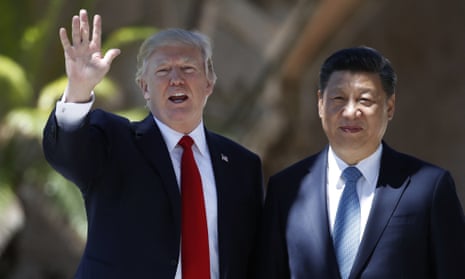Chinese president Xi Jinping has invited Donald Trump to pay a state visit to China later this year during a intensely choreographed visit to the billionaire’s Florida estate that was shunted from the headlines by the airstrikes on Syria.
Beijing had hoped to use the two-day summit to burnish Xi’s credentials as a powerful world leader who had successfully tamed the US’s volatile commander-in-chief and Chinese propaganda chiefs battled to keep the spotlight on Mar-a-Lago despite the dramatic turn of events in the Middle East.
On Saturday the Communist party’s official mouthpiece, the People’s Daily, carried two photographs of Xi and Trump on its front page but relegated the Syria crisis to a brief story at the top of page 11.
Air strikes? What air strikes? A tiny, tiny news-in-brief about Trump's dinner-time Syria attack on page 11 of China's People's Daily today pic.twitter.com/la9MhLBMqW
— Tom Phillips (@tomphillipsin) April 8, 2017
The China Daily, an English-language mouthpiece, also brushed over the US strikes, with headline writers instead focusing on a “new era” of ties with Washington.
Xinhua, China’s official news agency, said Xi had invited Trump to make a state visit to China in 2017 and that the US president had “accepted the invitation with pleasure, and hoped to make the trip at an early date”.
At a press briefing in Florida, marking the end of the Chinese president’s visit, the secretary of state, Rex Tillerson, said Trump had welcomed Xi’s invitation but declined to specify when the visit would happen. “The president said that he would look at the dates, and we would work with them to see when that visit might occur,” he said.
Tensions between the leaders of the world’s two largest economies spiked following Trump’s shock election last November with many predicting a dramatic downturn in relations. The former reality TV star has spent years bashing China and described the country as an enemy of the United States in his campaign manifesto.
However, the bad-blood began to subside in the lead-up to Thursday’s meeting after Trump backed away from threats to challenge Beijing over Taiwan and failed to follow through on threats to label China a currency manipulator on day one of his administration.
Tillerson told reporters that “both the atmosphere [and] the chemistry between the two leaders was positive”, at Mar-a-Lago.
Xi and Trump had held “very frank” and “very positive” discussions on issues including North Korea’s weapons program, the South China Sea, cyber security and trade.
“The president underscored the need for China to take concrete steps to level the playing field for American workers, stressing repeatedly the need for reciprocal market access,” Tillerson said.
Environmentalists fear climate collaboration between the US and China - one of the brightest spots of relations under Barack Obama – will suffer now that Trump, who has called climate change a Chinese hoax, is in the White House.
And in an indication that joint efforts to tackle global warming will lose steam, the commerce secretary, Wilbur Ross, admitted the environment “was not a major part of the discussion, nor do I recall the Chinese specifically raising it”.
Asked if Trump had raised human rights with Xi, who has presided over what activists call the worst crackdown since the days after the 1989 Tiananmen massacre, Tillerson claimed such issues had been “really embedded in every discussion”.
Experts say China, which along with Russia has repeatedly blocked UN resolutions against Syrian dictator Bashar al-Assad, will have been both discombobulated and upset at how Trump’s air strikes overshadowed the summit.
Tillerson said Trump had informed his guest of the military intervention towards the end of their dinner on Thursday night, at about 8.40pm local time. He claimed Xi had “expressed an appreciation for the President letting him know …. [and] indicated that he understood that such a response is necessary when people are killing children”.
A spokesperson China’s foreign ministry said it opposed the use of force in international affairs but stopped short of explicitly condemning the US attack.
Chinese newspapers glossed over such thorny questions, putting a positive spin on the first face-to-face meeting between two of the world’s most powerful men.
“At the end of last year people across the world were concerned about China-US relations,” said an editorial in the Chinese-language edition of the Global Times newspaper. “Now, optimistic moods have gained the upper hand.”
Additional reporting by Wang Zhen

Comments (…)
Sign in or create your Guardian account to join the discussion